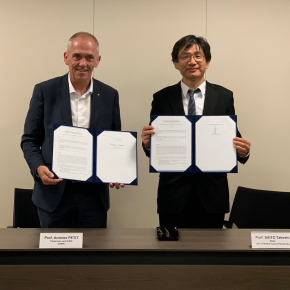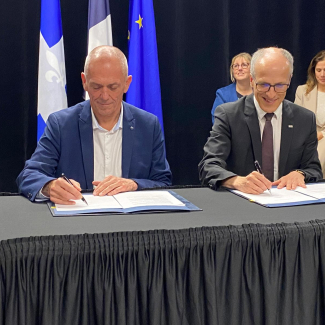
One year on, the International Research Center with The University of Tokyo demonstrates its critical role as a booster of collaborations
In early October 2023, Antoine Petit travelled to Japan, one of the CNRS's major international partners, to take part in the steering committee meeting for the International Research Center with The University of Tokyo, one year after its inauguration, and to launch a new International Research Laboratory in mathematics.
From October 1 to 3, 2023, Antoine Petit, President and CEO of CNRS, was in Japan, one of CNRS's main international partners. The trip was an opportunity to assess the progress of the new International Research Center (IRC1 ) with the prestigious University of Tokyo (UTokyo), Japan's leading academic institution. Barely a year after its inauguration, it is already bearing fruit. On October 3, Antoine Petit and Teruo Fujii, President of UTokyo, signed a framework agreement creating a new International Research Laboratory2 : the French-Japanese Laboratory of Mathematics and its Interactions (FJLMI). As the first international laboratory in Japan devoted to mathematics, both fundamental and applied, this laboratory demonstrates, according to its French director Michael Pevzner, the success of “Franco-Japanese collaboration in mathematics which, for over 90 years, has led to important discoveries and exerted a profound influence on modern mathematics”.
The creation of this fifth international laboratory with UTokyo – home to almost half of Japan's 11 international laboratories – is part of a growing trend. Since 2021, scientific collaborations and institutional partnerships have been multiplying with Japan's leading university in terms of number of publications. In just two years, three international laboratories have been created, at a steady rate of one a year: ILANCE3 in 2021 on the physics of the two infinites, DYNACOM4 in 2022 on the ultra-rapid control of materials and now FJLMI, which join the older LIMMS5 (1995) dedicated to electromechanical microsystems and JFLI6 (2012) devoted to computer science.
The International Research Center as a booster for collaborations
And the wave is not about to subside, given the role played by the International Research Center in accelerating collaboration between the two institutions since it was set up last year. At the inauguration of the FJLMI, Antoine Petit expressed his satisfaction at the rapid success of this International Research Center: “With President Teruo Fujii, we decided in 2022 to create this International Research Center to give concrete expression to our strategic dialogue that started a few years ago. I'm really surprised by the impact and performance of this structure in just one year of existence”. Following the example of the exploratory working group on mathematics, other groups may soon be consolidating their cooperation, such as the energy working group, which has been active for ten years and until now specialized in photovoltaic cells, and which has defined new scientific priorities for the International Research Project NextPV7 , refocusing it on solar cells and hydrogen.
- 1An International Research Center (IRC) is a new institutional arrangement that aims to establish an ambitious strategic dialogue between CNRS and its academic partner abroad. It allows them to define their common interests and the collaborations that will enable them to meet them together, in the form of international research laboratories, research projects, thematic networks or other existing or future arrangements.
- 2International research laboratories are international research facilities where research activities are conducted jointly around shared scientific themes. They structure the significant and lasting presence of scientists from a limited number of French and foreign research institutions (only one foreign partner country) in an identified location. The duration of these units is five years.
- 3CNRS / The University of Tokyo.
- 4CNRS / University of Rennes / The University of Tokyo.
- 5CNRS / The University of Tokyo.
- 6CNRS / The University of Tokyo / Sorbonne University / Keio University / National Institute of Informatics.
- 7CNRS / University of Bordeaux / The University of Tokyo.
The STS Forum in Kyoto
As soon as he arrived in Japan, Antoine Petit represented the CNRS at the Science and Technology in Society (STS) Forum. For almost 20 years, the city of Kyoto has welcomed the scientific and technological community to this global movement of high-level leaders in the fields of politics, business, research and education, who meet in the former imperial capital, now a place synonymous with cutting-edge science and technology.
Antoine Petit moderated a round-table discussion on the path towards sustainability. Based on the observation that we are unfortunately making very little progress and that we are still on the same unsustainable track, the participants in the round-table discussion outlined their concrete actions to remedy the situation. To discuss this major issue and compare approaches, Antoine Petit was joined by Michael V. Drake, President of the University of California, Teruo Fujii, President of The University of Tokyo, Masahito Moriyama, Japanese Minister of Education, Culture, Sports, Science and Technology (MEXT), and Marie-Noëlle Semeria, Chief Technology Officer at TotalEnergies.
50 years of scientific cooperation between France and Japan
Just like these cooperation programs, the two institutions are looking to the future and to future research, with the aim of, in the words of Teruo Fujii, “establishing closer links between our two organizations”. With this in mind, three new exploratory working groups were proposed by CNRS and accepted by UTokyo at the October 3 meeting: “Data for Earth Observation”, which contemplates organizing a first workshop as early as next year; “AI for Science & Science for AI”, derived from a challenge in the CNRS's 2019 - 2023 Contract of Objectives and Performance, which could aim for an institutional partnership with UTokyo's “Beyond AI” initiative; and “Social Sciences”, which will draw on the French Research Institute on Japan at Maison franco-japonaise in Tokyo, one of the French research institutes abroad supervised by the French Ministry of Foreign Affairs, to carry out local actions as early as 2024. Young researchers from France and Japan are forecasted to play a crucial role within this dynamic. Thus, following the success of the first two editions, a new PhD Joint Program call targeting the themes of the five International Research Laboratories and the three exploratory working groups should be opening soon.
2024 will mark the fiftieth anniversary of scientific collaboration between France and Japan. The new FJLMI laboratory, in particular, will celebrate this milestone with its inaugural conference, which will be held at the beginning of the year. As Antoine Petit suggests, this singular year “could be a good opportunity to highlight our special cooperation, to use it as an example”. Indeed, beyond UTokyo alone, Japan ranks as CNRS's leading international partner by number of institutional arrangements. It is also the country with which CNRS shares the largest number of international laboratories, as well as its tenth partner by number of scientific co-publications. And the interest is mutual: in 2020, five French laboratories, including four led by CNRS and its French partners, had been selected by the “Core-to-Core” program to participate in world-class research clusters in cutting-edge fields deemed essential by the Japanese government, making France second only to the UK in the ranking of countries most involved in this program. A special relationship, nurtured by mutual esteem and a desire to work together, seems to unite the two countries. Looking back on his experience with FJLMI, Michael Pevzner comments that “what was important was that our cooperation was truly fruitful, overcoming even stimulating coopetition, to become anchored in an ever-renewing mutual interest”.


